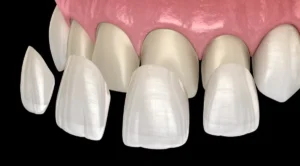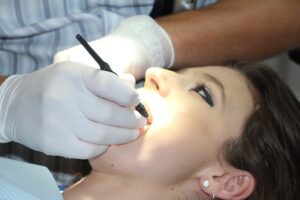Dental veneers are thin, custom-made shells of tooth-colored materials designed to cover the front surface of teeth to improve their appearance. They’re a popular cosmetic dentistry option for those looking to enhance their smile.
Key Takeaways:
- Dental veneers are thin shells that cover the front of teeth to improve appearance
- They can fix various dental issues like discoloration, chips, and gaps
- Porcelain and composite resin are the main types of veneers
- The process usually takes 2-3 appointments to complete
- Veneers can last 10-15 years with proper care
- They’re a permanent solution as some enamel is removed
- Regular dental hygiene is crucial for maintaining veneers
What Are Dental Veneers?

Dental veneers are custom-made, wafer-thin shells that dentists attach to the front of teeth. They’re designed to improve the appearance of your smile by changing the color, shape, size, or length of your teeth. Veneers are a popular choice for those looking to fix cosmetic dental issues without more invasive procedures.
Types of Dental Veneers
There are two main types of dental veneers:
- Porcelain Veneers: These are the most common type. They’re made from a strong, thin ceramic material that mimics the light-reflecting properties of natural teeth.
- Composite Resin Veneers: These are made from a tooth-colored filling material. They’re less expensive than porcelain but don’t last as long and aren’t as stain-resistant.
Why Choose Dental Veneers?

Dental veneers can solve a variety of cosmetic dental issues. They’re a good option if you have:
- Discolored teeth that haven’t responded to whitening
- Chipped or broken teeth
- Gaps between teeth
- Misaligned or unevenly shaped teeth
- Worn down teeth
Veneers offer a relatively quick way to achieve a dramatic smile makeover. They’re custom-made to match your natural teeth, so they look authentic and blend in seamlessly.
The Dental Veneer Process
Getting dental veneers usually involves several steps:
Initial Consultation
During your first visit to our Ottumwa dental office, we’ll discuss your goals and examine your teeth to make sure veneers are the right option for you. We might take x-rays or make impressions of your mouth and teeth.
Preparation
To prepare a tooth for a veneer, we’ll remove about 1/2 millimeters of enamel from the tooth surface. This is roughly equal to the thickness of the veneer that will be added to the tooth surface. We’ll then make a model or impression of your tooth.
Bonding
Before the dental veneer is permanently cemented to your tooth, we’ll temporarily place it on your tooth to examine its fit and color. We’ll repeatedly remove and trim the veneer as needed to achieve the proper fit. The veneer color can be adjusted with the shade of cement to be used. Next, we’ll clean, polish, and etch your tooth to prepare it for bonding. We’ll apply special cement to the veneer and place it on your tooth. Once it’s properly positioned, we’ll apply a special light beam to the dental veneer, which activates chemicals in the cement, causing it to harden or cure very quickly.
Final Adjustments
The final steps involve removing any excess cement, evaluating your bite, and making any final adjustments in the veneer as necessary.
Caring for Your Dental Veneers
With proper care, your veneers can last 10-15 years. Here are some tips to help maintain your veneers:
- Brush and floss regularly
- Avoid biting on hard objects (like ice or pens)
- Don’t use your teeth as tools to open packages
- Wear a mouthguard if you grind your teeth at night
- Visit your dentist regularly for check-ups and cleanings
Pros and Cons of Dental Veneers
Like any dental procedure, veneers have their advantages and disadvantages:
Pros:
- Provide a natural tooth appearance
- Gum tissue tolerates porcelain well
- Porcelain veneers are stain-resistant
- The color can be selected to make dark teeth appear whiter
Cons:
- The process is not reversible
- Veneers are not repairable if they chip or crack
- Because enamel has been removed, your tooth may become more sensitive to hot and cold foods and drinks
- Veneers may not exactly match the color of your other teeth
- Though unlikely, veneers can dislodge and fall off
Dental Veneers vs. Other Cosmetic Dentistry Options
While veneers are a popular choice, they’re not the only option for improving your smile. Let’s compare veneers to other common cosmetic dentistry procedures:
| Procedure | Pros | Cons | Durability |
|---|---|---|---|
| Veneers | Natural look, stain-resistant, can fix multiple issues | Permanent, can’t be repaired if damaged | 10-15 years |
| Teeth Whitening | Non-invasive, affordable | Only addresses color, not shape or alignment | 6 months – 3 years |
| Dental Bonding | Quick, affordable, reversible | Not as durable as veneers, can stain | 3-10 years |
| Crowns | Protects and strengthens tooth | More tooth reduction required | 10-15 years |
Cost of Dental Veneers
The cost of dental veneers can vary based on several factors:
- Type of veneer (porcelain is typically more expensive than composite)
- Number of teeth being treated
- Additional procedures needed (like a root canal or crown)
In Ottumwa, Iowa, the cost for a single veneer can range from $800 to $2,500. Most dental insurance plans consider veneers a cosmetic procedure and don’t cover the cost. However, our office offers payment plans to help make veneers more affordable.
Are Dental Veneers Right for You?
Deciding whether to get dental veneers is a personal choice that depends on your specific dental needs and goals. Here are some factors to consider:
- Your budget
- The condition of your teeth
- Your expectations for your smile
- Your willingness to maintain good oral hygiene
If you’re considering veneers, schedule a consultation with our Ottumwa dental office. We can assess your oral health and help you decide if veneers are the best option for your smile.
The Impact of Dental Veneers on Oral Health
While veneers are primarily a cosmetic procedure, they can have some positive impacts on your oral health:
- They can protect damaged teeth from further wear
- By improving your smile, they might motivate you to take better care of your teeth
- They can help correct slight misalignments that might otherwise cause uneven wear on your teeth
However, it’s important to note that veneers are not a substitute for good oral hygiene. You’ll still need to brush, floss, and visit your dentist regularly to maintain your oral health.
Frequently Asked Questions About Dental Veneers
Here are some common questions we get about dental veneers in our Ottumwa office:
- Are veneers painful? The procedure itself is not painful as we use local anesthesia. Some people might experience sensitivity for a few days after the procedure.
- Can I still get cavities with veneers? Yes, you can still get cavities. Good oral hygiene is essential.
- Will veneers make my teeth look fake? When done properly, veneers should look natural. We take great care to match the color and shape of your natural teeth.
- Can I whiten my veneers? Veneers resist staining and cannot be whitened. If you’re planning on whitening your teeth, do so before getting veneers.
- How long do veneers last? With proper care, veneers can last 10-15 years.
- Dental veneers are thin, custom-made shells designed to cover the front surface of teeth to improve their appearance. They are typically made of porcelain or composite resin material.
Conclusion:
Dental veneers offer a way to dramatically improve your smile and boost your confidence. They’re a versatile solution that can address multiple cosmetic issues at once. While they require a permanent change to your teeth and regular maintenance, many people find the results well worth it.
If you’re in Ottumwa, Iowa, and you’re considering veneers, we invite you to schedule a consultation with our dental office. We can assess your individual needs and help you decide if veneers are the right choice for your smile. Remember, a beautiful smile is an investment in yourself, and we’re here to help you achieve the smile you’ve always wanted at Inspire Dental.
